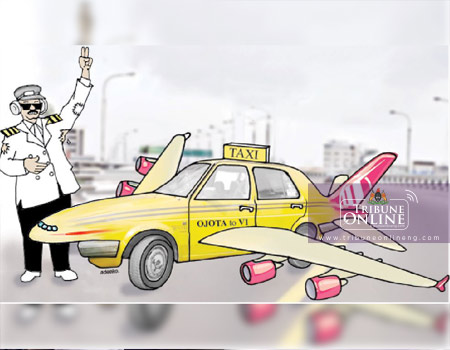IN the years gone by, employees in the nation’s aviation industry are the envy of many people. From pilots to cabin crew members and technical staff, many would give an arm to be employed in the industry, but not anymore. That story has changed.
The problem of high rate of unemployment has invariably crept into the country’s aviation industry and it has continued to generate a debate amongst key players in the sector. As of today, more than 500 of these professionals are currently jobless, with many, including pilots now driving cabs, commonly known as kabu kabu, to survive. Therefore, it is not uncommon to hear this issue being one of the major points of focus at different aviation forums. The implications of rising cases of unemployed professionals, particularly pilots and engineers, for the nation have engaged the attention of stakeholders and often take the centre stage at such discourses.
From records, there are over 600 unemployed pilots and aircraft technicians roaming the country in search of jobs. Many of these professionals, Sunday Tribune investigation revealed, had undergone quality training in reputable aviation institutions across the world. But that training is being put to waste as a result of the problem in the sector.
Sunday Tribune learnt that the problem in the sector could have been self-inflicted as a result of policy flip-flop. About five years ago, the story in the sector, according to some of the experts who volunteered information, was different. It was that of imminent shortage of young professionals that would replace the aging workforce, with stakeholders calling for the training of younger people in the different sectors of the aviation industry.
The Federal Government as well as Kano State government, it was said, took steps to train some young pilots, engineers, dispatch riders, aeronautical information officers, amongst other aviation professionals. During the period, the Federal Government also embarked on the training of over 127 ex-militants and other persons from the Niger Delta region as aircraft pilots and maintenance engineers under the Presidential Amnesty Programme (PAP) in various institutions in North America, Europe, Asia and South Africa.
Kano State, under the youth empowerment programme, undertook the training of about 100 youths in Jordan in addition to the personnel trained by aviation agencies, airlines and individuals, giving a combined figure of almost 2,000 personnel far trained as pilots, aircraft engineers and professionals in other critical fields in the past five years, with many of them successfully acquiring the Private Pilot Licence (PPL) and Commercial Pilot Licence (CPL) which qualify them to operate or man airplanes.
However, despite the huge investment in these pilots a majority of them have nothing to do. From the last count, as declared by various key players in the sector, there are over 500 pilots and aircraft engineers currently unemployed apart from many others in critical sectors of the industry.
According to the President, Airline Operators of Nigeria (AON), Captain Nogie Meggison, the rising number of unemployed pilots has become quite alarming. Giving a breakdown of the number of the unemployed, he disclosed that before the training of over 100 pilots five years ago by the Kano State, there were already about 200 unemployed pilots in the sector.
In addition to that, Meggison said 52 youths were trained on the FG amnesty programme with fresh batches of 100 students who graduated from the Aviation College in Zaria and over 40 students from International Aviation College (IAC) Ilorin, Kwara State, bringing the number to over 500.
Corroborating Meggison’s claim on the number of jobless aviation professionals, Ahmed Roland Maikudi, a trained aircraft engineer, who is also the National Vice-President, National Association of Aircraft Pilots and Engineers ((NAAPE), said unemployed pilots are about 300, while putting the figure of aircraft engineers without job at 200.
The beginning of the problem…
One of the factors key operators and professionals in the industry have often cited as the major cause of the high rate of unemployment of professionals is the decision of the Federal Government to liquidate the former national carrier, Nigeria Airways.
According to the Chief Executive Officer (CEO) of the Medview Airlines, Alhaji Muneer Bankole, the demise of the former national carrier, Nigeria Airways, did not create room for required and adequate training and type-rating for fresh pilots in the sector, declaring that with the Nigeria Airways still operational, the unemployed pilots would have been gainfully absorbed to get the requisite experience, adding that the airline trained many pilots including female pilots in Miami, United States of America, for the sector.
“Where are the 500 pilots and engineers in Nigeria? In our airline, we have Nigerians that were trained by Nigeria Airways. The liquidation of Nigeria Airways led to dearth of professionals. We have only Nigerian College of Aviation Technology, Zaria and now the Ilorin International Aviation College that train pilots.
“How many pilots are produced annually by these institutions? Who produced the 500 pilots? Which schools did those unemployed pilots attend? The country needs to reproduce. Some of us went through rigorous training before we can be where we are today,” he said.
Another reason that stakeholders provided, which confirmed Alhaji Bankole›s position on the absence of practical aviation platform like the Nigeria Airways for these young pilots to hone their skills, is the inability of these pilots to acquire the requisite flying time. According to experts, for the students to graduate, they need to accumulate about 250 hours of flying time and to be type-rated on airplanes.
The majority of the fresh graduate pilots are yet to be type-rated on any aircraft brand, a situation which has made them unemployable by the operating airlines in the country who are not willing, most times, to train pilots for the sector.
During the Goodluck Jonathan administration, Sunday Tribune, was informed, Nigerian pilots were guaranteed employment by indigenous airlines with the mandatory “one Nigerian pilot in the cockpit” rule.
Also, as part of acquiring the Air Operator’s Certificate (AOC) by intending carriers, the then Aviation Minister, Osita Chidoka, mandated the Nigerian Civil Aviation Authority (NCAA) to ensure that such carriers show their training and developmental programmes for professionals in the sector without which such airlines would not be issued AOCs.
Two years after the order, it is not certain if the policy, which was expected to have taken effect from July 1, 2015, ever took off, while the number of jobless pilots and engineers continues to rise.
Influx of foreign pilots, engineers…
But perhaps the most serious of the factors all major stakeholders adduced for the growing unemployment in the aviation sector is what they termed government’s crippling policy on foreign aviation professionals.
Some of them, who spoke to Sunday Tribune on the condition of anonymity for fear of being victimised, took a swipe at government for failing to enforce policies that should promote and protect the indigenous airlines who would subsequently employ the indigenous professionals.
According to them, rather than do this, government has been giving preferential treatment to foreign airlines which in turn bring in even few qualified hands from their home countries at the expense of qualified Nigerian professionals.
On his part, Meggison, who confirmed this development, cautioned that unless something fast is done, the growing unemployment of pilots may cause a disincentive to the growth and development of the Nigerian aviation industry.
He raised the concern of other stakeholders over the influx of foreign pilots and engineers in the industry. According to him, there are no fewer than 1,000 foreign pilots engaged by both local and foreign registered airlines and over 500 foreign aircraft engineers employed in the country.
To check the high unemployment rate in the sector, Meggison called for the creation of an enabling policy that would check the influx of foreign pilots and engineers in the industry, stressing that some domestic carriers have done well by engaging some of the pilots.
“The government should compel foreign carriers to set up a line station for aircraft maintenance in the country and employ local engineers to assist in turning around the growth of the sector. They should look into other avenues also. If policies are not put in place the challenge of unemployment of pilots and engineers may not be resolved as soon as possible.
“It is shameful that Nigerian licensed youth pilots are now driving kabu kabu to make ends meet. This is totally unacceptable. Not that there are no jobs, but jobs are taken over by foreigners in the country.
“Over the years, the aviation industry has grown. About six years ago, the number of private jets has increased from 20 to 150. Even, commercial airplanes have grown from 20 to 100, but it has not reflected on the employment of our youths, who are trained as pilots,” he said.
Like Meggison, Captain Dele Ore, a pilot and former Commander of the country’s Presidential fleet, described the situation of the high unemployment rate in the sector as sordid.
Ore, blamed the pilots’ joblessness on the absence of a well thought-out government policy while lamenting that the development had led to a situation whereby the whole industry was being taken over by foreigners.
While insisting that government cannot force the local airlines to employ Nigerians, as some of them are facing hard times and struggling to survive, Ore advocated a ’deliberate government policy’ that would encourage airlines to ensure that a Nigerian passport holder sits on the cockpit of every aircraft flying in the country’s airspace.
How Unemployed Pilots can spread their wings…
There is a general consensus in the aviation industry that for the unemployed professionals to be gainfully employed, there is the need for government to review all its policies and create an industry-friendly environment for domestic airlines, while government should also enforce the law that will make it compulsory to employ qualified Nigerian professionals as it is being done in other climes.
According to Alhaji Bankole one way to solve the problem is for government to compel airline operators to embark on training and retraining of young professionals. The CEO of Medview Airlines declared that though training and type-rating of pilots would improve employment generation for the industry, most of the indigenous carriers are not interested in training of technical personnel, but rather prefer to engage in poaching from other airlines.
“However, in order to solve this problem,” he said, “Government should ask individual airlines to come together and advise It on how to improve the sector. We need commitment from individual carriers on manpower development for us to grow the sector.”
For Meggison, while acknowledging that some domestic carriers have done well by engaging some of the pilots, he urged the Federal Government to put in place an employment policy that would ensure that aviation professionals were engaged by both indigenous and foreign carriers operating in the country.
Making reference to what they called Federal Government›s ‘watery’ expatriate quota policy, some workers in the various airlines, who spoke with Sunday Tribune argued that unless government urgently reviews its expatriate quota policy, many young Nigerian professionals will continue to lose their jobs to less qualified foreigners in the sector.






